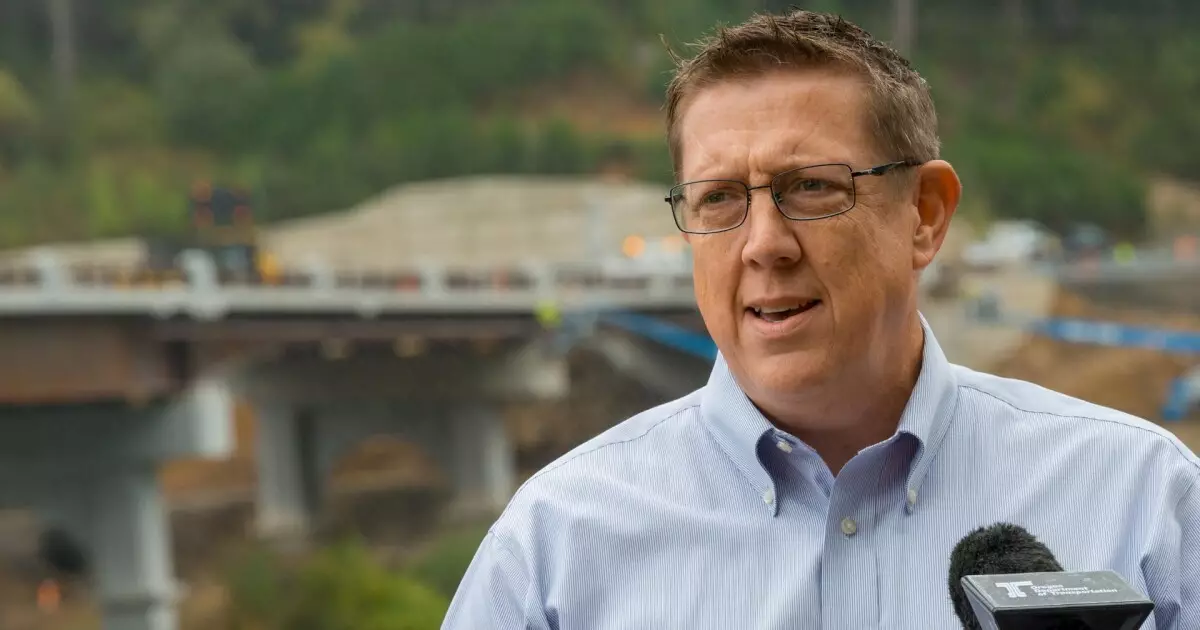Oregon’s transportation infrastructure, often regarded as the backbone of economic vitality and daily mobility, finds itself dangling precariously on the edge of collapse—an unthinkable consequence of political paralysis. When the legislature failed to pass any form of comprehensive transportation funding package before adjourning, it wasn’t merely a missed bill; it was a declaration of neglect with devastating ramifications. The impending layoffs of nearly 700 Oregon Department of Transportation (ODOT) workers symbolize a broader failure—an abandonment of responsibility that imperils the very fabric of Oregon’s future connectivity and economic health.
The shutdown of critical funding streams exposes a chronic issue: political indecisiveness and bureaucratic inertia overshadowed urgent infrastructure needs. The problem isn’t just the immediate loss of jobs but the erosion of a system designed to serve the public—roads, bridges, maintenance, and safety—all hang in the balance. These layoffs, scheduled to commence imminently, signal a crisis where essential services and community safety are sacrificed due to political failure. Oregon’s lawmakers must face the uncomfortable truth—failing to secure vital funding now will cost the state far more in the long term, through declining economic productivity, increased accidents, and deteriorating infrastructure.
The Political Stagnation: A Costly Silence
For years, ODOT’s leadership has warned of the looming financial cliff—an insidious result of declining gas tax revenues, legislative restrictions, and inflationary pressures. Rather than confronting these structural challenges head-on, the legislature’s inability to pass a budget reflects a deeper malaise rooted in partisanship and political posturing. The failed effort to pass House Bill 2025, which sought to raise $14.6 billion through increased taxes and fees, epitomizes this stagnation.
The bill’s collapse wasn’t merely a matter of budget math; it symbolized a failure of governance. Repeatedly, bipartisan cooperation seems elusive when it comes to funding critical infrastructure—an issue that touches every Oregonian’s daily life. The consequence: vital maintenance and operational funds remain frozen, with federal or alternative sources unable or legally restricted from bridging the gap. As a result, Oregon’s transportation network, already strained by a reliance on declining revenue streams, is left vulnerable.
The political debate surrounding tax increases, often painted as contentious, overlooks the stark reality—the short-term pain is preferable to long-term catastrophe. Infrastructure isn’t just about roads and bridges; it’s about economic resilience, public safety, and the ability to sustain growth in a competitive region. The lawmakers’ failure to act demonstrates a dangerous prioritization of political posturing over pragmatic governance, and Oregon pays the price in both lost jobs and compromised infrastructure.
The Human Cost: Jobs, Morale, and Public Trust
The immediate impact of legislative inertia manifests painfully in the workforce. Nearly 700 employees face layoffs, a number that doesn’t just represent job losses but also symbolizes the erosion of morale and confidence within an essential public agency. These workers are the backbone of Oregon’s transportation system, responsible for maintaining roads, bridges, and safety protocols vital to millions of residents and commerce.
The tone set by ODOT’s leadership paints a bleak picture. In their urgent communications, they describe the process as “shocking, scary, and frustrating.” Such language underscores the human toll—families fearing financial instability, employees feeling betrayed by their government, and a broader sense of disillusionment creeping into public service. These layoffs serve as a stark reminder that public institutions—designed to serve and protect—are vulnerable when political will falters.
Furthermore, this crisis undermines public trust. When citizens see lawmakers neglect fundamental infrastructure needs, confidence in government erodes. People begin to question whether their representatives prioritize partisan battles over practical governance. “Who will fix our roads? Who will keep our transportation safe?” become rhetorical questions that reflect growing skepticism and cynicism.
The Broader Implications: Economic and Social Fallout
The downfall of Oregon’s transportation funding effort doesn’t merely result in short-term job cuts; it threatens the integrity of the entire state’s economic future. A decline in maintenance and operational capacity jeopardizes transportation safety, increases vehicle wear and tear, and hampers commerce—particularly in a state heavily reliant on transportation corridors for trade and tourism.
Moreover, with federal funds unable to fill the gap—owing to legal restrictions and the state’s own statutes—the financial shortfall becomes even more pronounced. The state’s inability to adapt quickly could lead to a cascade of problems, including deteriorating roads that burden taxpayers more in future repairs and increased congestion that hampers economic activity.
This crisis starkly exposes a fundamental flaw in Oregon’s governance: the failure to adapt and evolve revenue structures that are increasingly inadequate. Relying heavily on gas taxes, which diminish as electric vehicles proliferate and transportation habits change, is a risky strategy that has left the state unprepared. If lawmakers cannot overcome partisan divides to forge a sustainable solution, the consequences will unfold over decades—deterioration of infrastructure, declining economic competitiveness, and a loss of faith in public institutions.
Without decisive action, Oregon risks becoming a cautionary tale of what occurs when political indecisiveness eclipses strategic planning. It’s a reflection of a broader national trend where infrastructure neglect precipitates crisis—that aging roads, bridges, and transit systems become insurmountable challenges rather than assets. For Oregon, the current moment demands leadership with the courage to confront uncomfortable truths, forge bipartisan solutions, and prioritize the collective good over political wins. Otherwise, the real damage will be not just to budgets and jobs but to Oregon’s future identity as a resilient and prosperous state.

